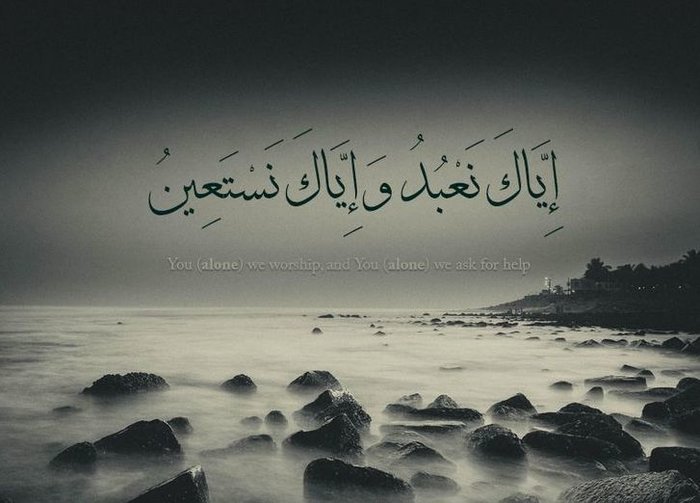Part 6 – Verse Number 5 of Surah Fatihah
Ihdina-s-sirata-l-mustaqim
“Guide us to the straight path.”
In the previous ayah, we affirmed that we seek help only from Allah. Now, what’s the most crucial help we need? Imagine you’re a Bedouin wandering around in a vast desert, completely lost, and you come across a man on a camel. What help do you ask from him? Water? Food? These will only keep you alive for a few more days, and then you’re back to square one.
“Just show me the shortest route to my house!” you shout.
The most crucial help you need is guidance.
Related: Surat-al-Fatihah Part 5
Ihdina
“Guide us to the straight path.”
Guidance – what does it mean? It entails much more than giving someone information. Imagine that it’s your first day at university, and you’re completely baffled by the campus map and numbering. So you go to student support and ask them for guidance to your first math class.
“Go to the cafeteria, turn right and walk till building B17, that’s the green building, then take a left turn and ….”
You get what they’re telling you, but you’re nervous. You feel that you just can’t do it alone, so you ask someone to accompany you. They take you all along the way and park you right in front of your classroom. That’s “ihdina”.
Ihdina without the absence of any preposition after it means: “Guide us to, through, and all the way to the end of” the Siratal Mustaqim. (Nouman Ali Khan)
Now, the walk towards Paradise is infinitely longer than the walk to your classroom. And so, every few hours you need to replenish your supply of hidaya. “Just like water in your body, you don’t get to keep it. You run out of it, and you have to get it again.”
“The word ihdina means not only ‘show us (the straight way)’, but also carries a much wider sense. Implied in this is a supplication for:
- firmness of belief in the correctness of this way,
- the granting of a desire and a will to pursue it, and
- to make any difficulties in the course of its pursuit easy.
“It also implies that after having guided to it, Allah would give us strength to persevere in it and not stray off into byways.” (Islahi 74)
Remember that time when you were sitting in a doctor’s waiting room scared to death, and your mom or dad sat beside you holding your hand tight? Remember when you were sweating and shaking while you stood in front of an auditorium-full of people, about to present your project, and your professor gave you a smile of encouragement? It was about giving you comfort and strength to embark on a feared mission.
Related: Surat-al-Fatihah Part 4
Al-Sirat Al-Mustaqim
“The Straight Path.”
When you say “the road”, what does that imply? You already know which road it is.
“… the straight path is the one that Allah, the Most Exalted, has Himself appointed for His servants…. All the prophets and messengers of Allah throughout history have called human beings to follow this path, and it has always been pursued by all truly righteous men and women.” (Islahi 74)
So no matter how people may try to divert you from it, no matter how many optional by-ways are open in life, and no matter how misguided we are, we know the Sirat al-Mustaqim.
“Though errant and misguided people have forged various crooked byways beside it, they have failed to block it or obfuscate it. It is still there, well-known and well-established, and anyone seeking the countenance of his Sustainer can follow it to attain his heart’s desire.” (Islahi 74)
“The Straight Path.”
The adjective straight (mustaqim) tells us that this path is the shortest route to our destination. It also tells us that the road isn’t horizontal but vertical, that every step you take on it raises you upwards. And the higher up you are on it, the more elevated you are above worldly concerns but, at the same time, the more disastrous it will be to fall down. (Nouman Ali Khan)
Na-
“Guide us to the straight path.”
Why do we ask for guidance for other people too?
“Because in this life,” explains Ustadh Nouman, “if you’re going to have a healthy relationship with Allah as an individual, you have to come together as a community to ask. You have to be with other people. You need other people for guidance. You can’t do it on your own.”
A Hadith About the Straight Path
The Prophet (sa) once explained what the sirat is with a very beautiful and vivid metaphor:
“Allah has set an example: A Sirat that is surrounded by two walls on both sides, with several open doors within the walls covered with curtains.
“There is a caller on the gate of the Sirat who heralds, ‘O people! Stay on the path and do not deviate from it.’
“Meanwhile, a caller from above the path is also warning any person who wants to open any of these doors, ‘Woe unto you! Do not open it, for if you open it you will pass through.’
“The straight path is Islam, the two walls are Allah’s set limits, while the doors resemble what Allah has prohibited. The caller on the gate of the Sirat is the Book of Allah, while the caller above the Sirat is Allah’s admonishment in the heart of every Muslim.” (Ahmad, qt in ibn Kathir)
Allah (swt) says: “And this is My path, which is straight, so follow it; and do not follow [other] ways, for you will be separated from His way. This has He instructed you that you may become righteous.” (Quran, 6:153)
>>> Understand the Quran in as little as 10 minutes/day. Click here to learn more.
Related: Video




Leave a Reply